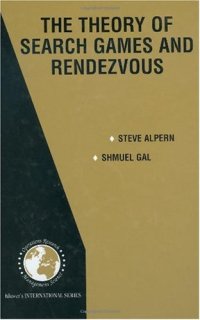
Ebook: The Theory of Search Games and Rendezvous
Author: Steve Alpern Shmuel Gal (auth.)
- Tags: Calculus of Variations and Optimal Control, Optimization, Game Theory Economics Social and Behav. Sciences, Economic Theory, Probability Theory and Stochastic Processes, Operations Research/Decision Theory
- Series: International Series in Operations Research & Management Science 55
- Year: 2003
- Publisher: Springer US
- Edition: 1
- Language: English
- pdf
Search Theory is one of the original disciplines within the field of Operations Research. It deals with the problem faced by a Searcher who wishes to minimize the time required to find a hidden object, or “target. ” The Searcher chooses a path in the “search space” and finds the target when he is sufficiently close to it. Traditionally, the target is assumed to have no motives of its own regarding when it is found; it is simply stationary and hidden according to a known distribution (e. g. , oil), or its motion is determined stochastically by known rules (e. g. , a fox in a forest). The problems dealt with in this book assume, on the contrary, that the “target” is an independent player of equal status to the Searcher, who cares about when he is found. We consider two possible motives of the target, and divide the book accordingly. Book I considers the zero-sum game that results when the target (here called the Hider) does not want to be found. Such problems have been called Search Games (with the “ze- sum” qualifier understood). Book II considers the opposite motive of the target, namely, that he wants to be found. In this case the Searcher and the Hider can be thought of as a team of agents (simply called Player I and Player II) with identical aims, and the coordination problem they jointly face is called the Rendezvous Search Problem.
The Theory of Search Games and Rendezvous widens the dimensions to the classical problem with the addition of an independent player of equal status to the searcher, who cares about being found or not being found. These multiple motives of searcher and hider are analytically and mathematically considered in the book's two foci: Search Games (Book I) and Rendezvous Theory (Book II). Shmuel Gal's work on Search Games (Gal, 1980) stimulated considerable research in a variety of fields including Computer Science, Engineering, Biology, and Economics. Steve Alpern's original formulation of the rendezvous search problem in 1976 and his formalization of the continuous version (Alpern, 1995) have led to much research in rendezvous theory in the past few years. New material is covered in both Search Games (Book I) and Rendezvous Theory (Book II). The book examines a whole variety of new configurations of theory and problems that arise from these two aspects of the analysis - resulting in a penetrating state-of-the-art treatment of this highly useful mathematical, analytical tool.